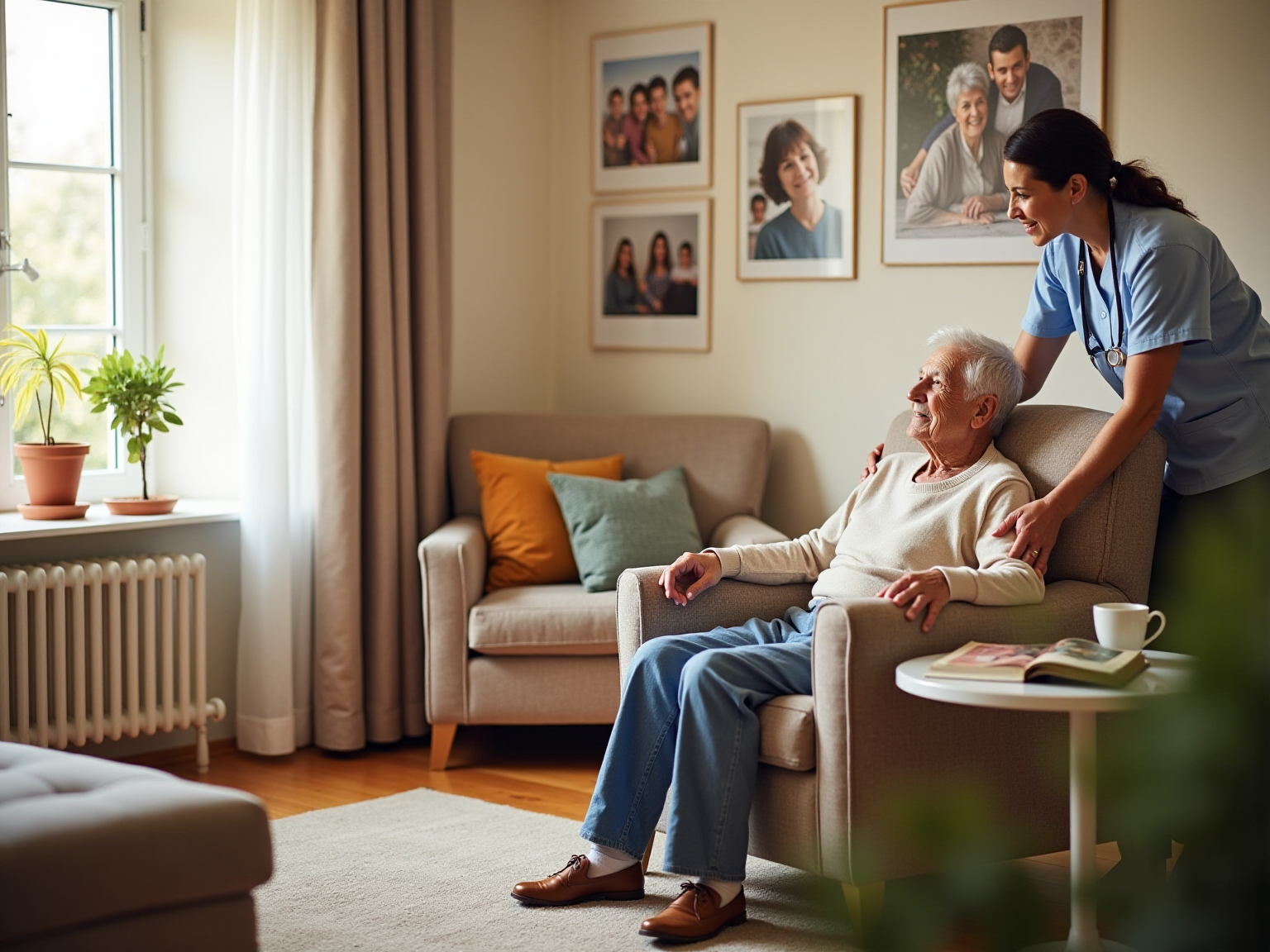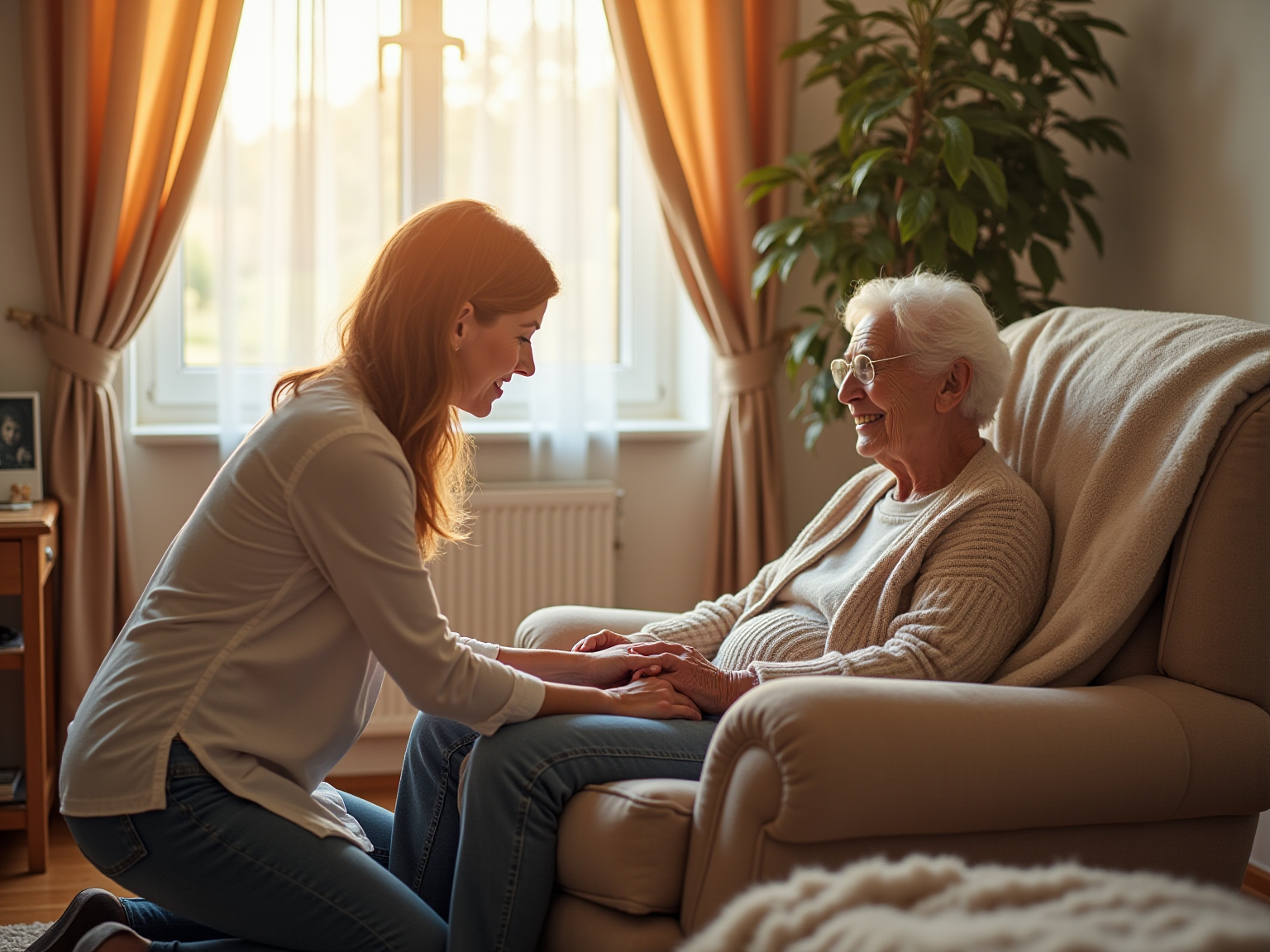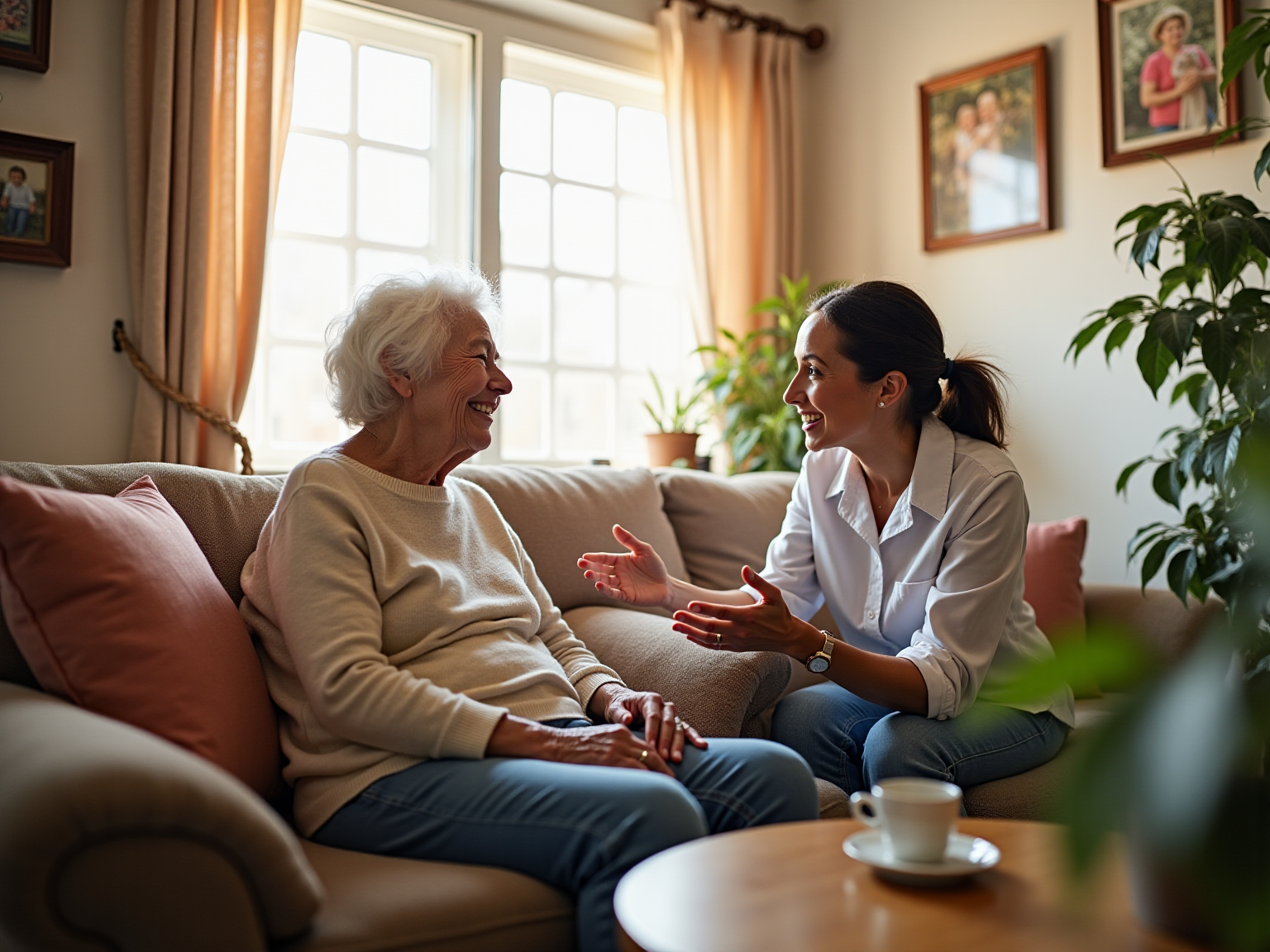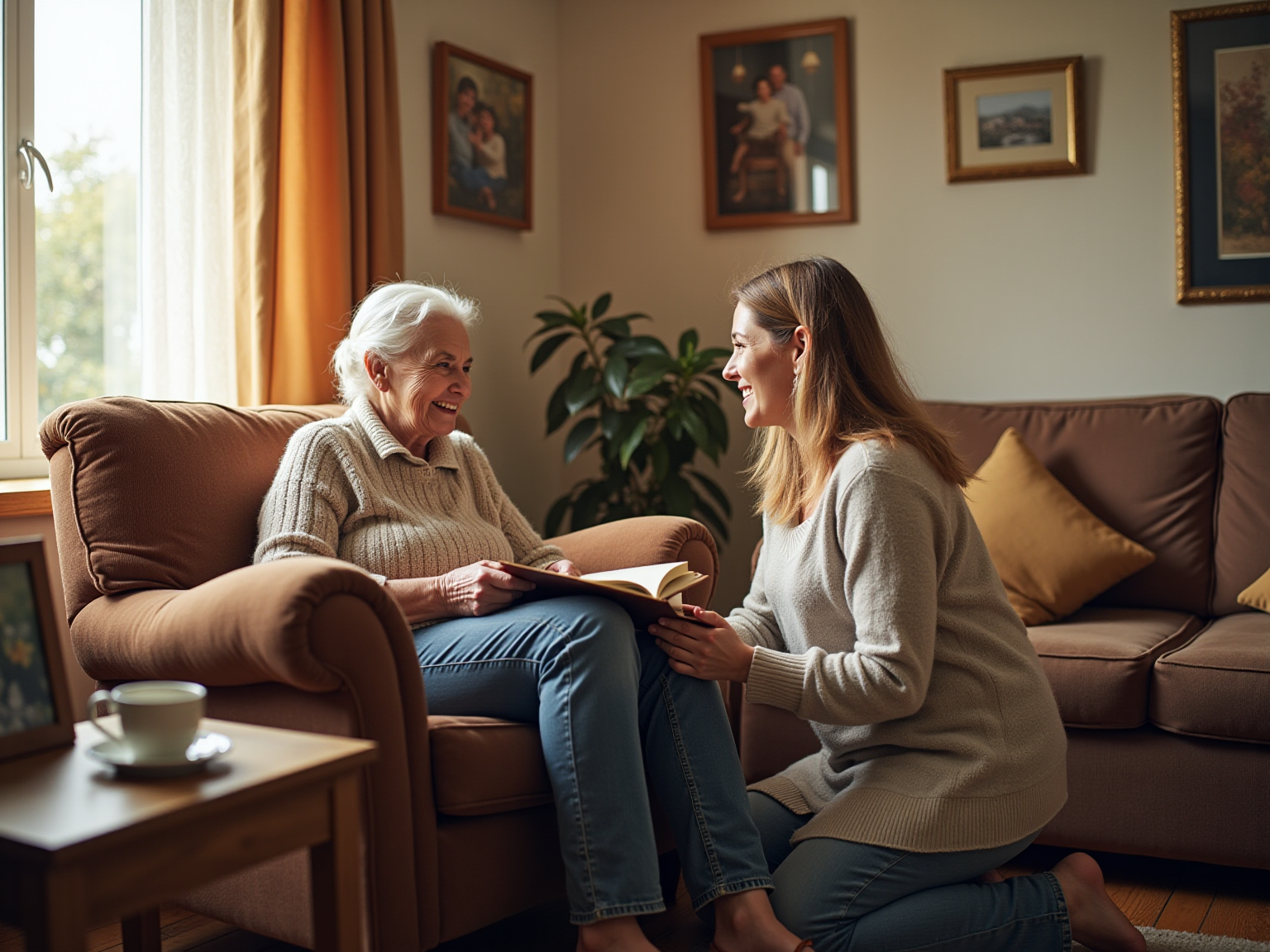Overview
Caring for the elderly at home is a journey that requires understanding and compassion. To ensure their comfort and well-being, it’s essential to consider four key steps:
- Recognize their unique needs; this acknowledgment is the foundation of effective care.
- Create a safe and comfortable environment, as this greatly enhances their quality of life.
- Establishing a consistent caregiving routine is also vital, as it provides structure and reassurance.
- Prioritizing caregiver well-being is crucial; after all, a supported caregiver can provide the best care.
Each of these steps is backed by practical recommendations that not only enhance the lives of elderly individuals but also support caregivers in managing their responsibilities. Remember, we’re here for you, and your comfort is our priority. By embracing these steps, you can create a nurturing atmosphere that benefits everyone involved.
Introduction
Caring for elderly individuals presents a unique set of challenges and responsibilities that require a thoughtful approach. As our loved ones age, understanding their specific needs becomes increasingly vital for caregivers and families alike. How can we ensure their well-being? From assessing physical health and emotional well-being to creating a safe home environment and establishing a consistent caregiving routine, each aspect plays a crucial role in enhancing the quality of life for elderly individuals.
Moreover, we must prioritize the well-being of caregivers, as their own health and happiness directly impact the care they provide. This article delves into practical strategies to support both seniors and their caregivers, ensuring a nurturing and safe atmosphere that fosters independence and dignity. Together, we can create an environment that not only meets the needs of our elderly loved ones but also uplifts those who care for them.
Understand the Unique Needs of Elderly Individuals
To effectively focus on caring for the elderly at home, it’s essential to start by assessing their unique needs. Consider the following aspects:
-
Physical Health: Evaluate any chronic conditions, mobility issues, or sensory impairments. Regular check-ups with healthcare providers can assist in monitoring these conditions. Without proper medical monitoring and assistance, chronic conditions may worsen, and new health issues can go unnoticed.
-
Emotional Well-being: Understand the emotional challenges seniors may face, such as loneliness or depression. Engaging them in conversations about their feelings and encouraging social interactions is crucial. After all, social isolation can lead to increased feelings of anxiety and depression.
-
Cognitive Function: Be aware of any cognitive impairments, such as dementia or Alzheimer’s disease. Tailor communication and activities to their cognitive abilities, ensuring they receive the support they need to maintain their independence.
-
Personal Preferences: Discuss their likes, dislikes, and routines. This aids in establishing a comfortable atmosphere that honors their uniqueness. Additionally, consider their need for assistance with daily activities. Help with personal hygiene, meal preparation, and medication management can significantly enhance their quality of life. Furthermore, be aware of domestic dangers that could present threats, guaranteeing a secure living space when caring for the elderly at home.
By considering these aspects, those providing assistance can develop a more nurturing and efficient care strategy. This approach improves the quality of life for senior citizens, ensuring they obtain the tailored support essential for their welfare. Remember, your comfort is our priority, and we’re here for you.
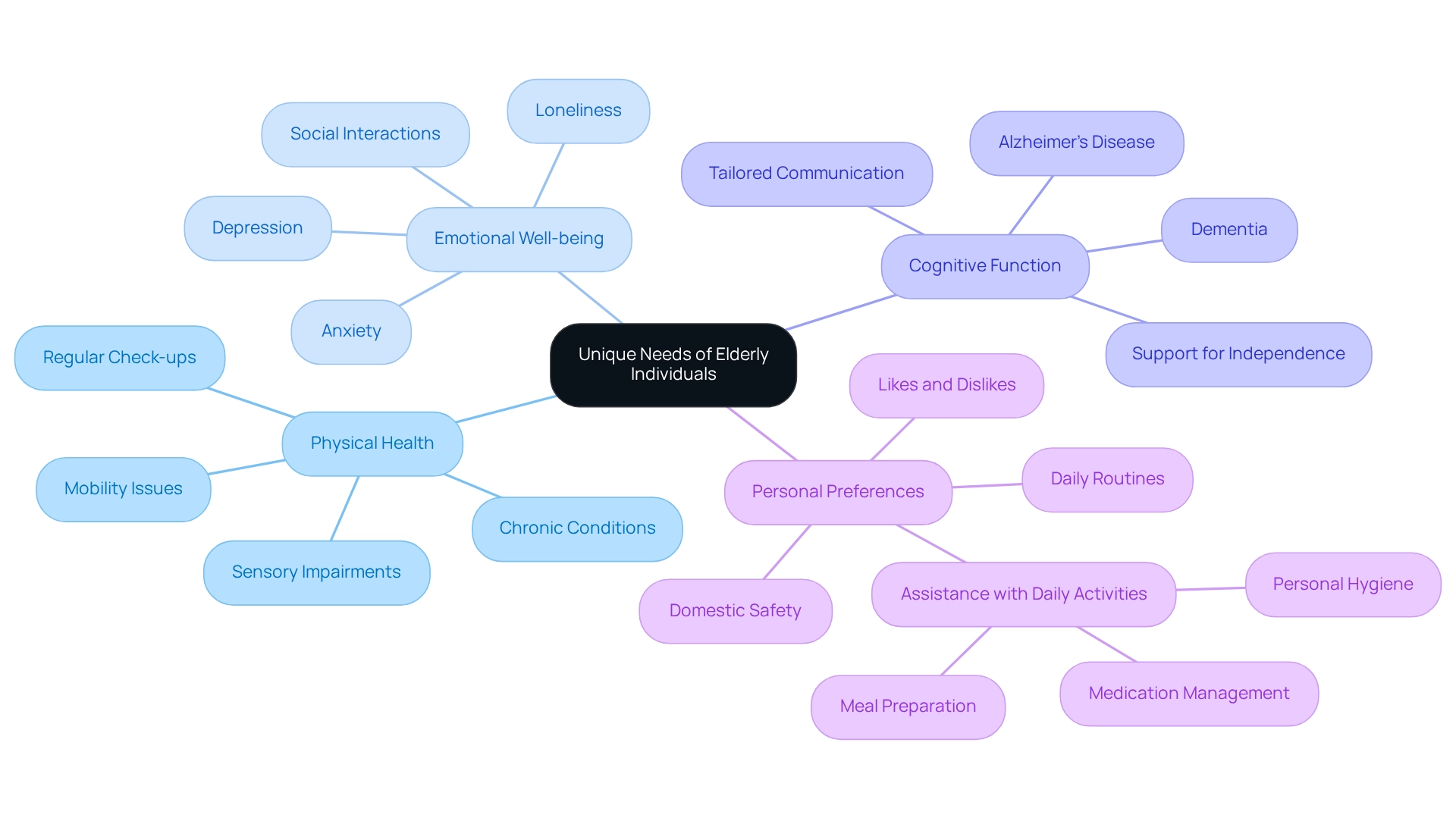
Create a Safe and Comfortable Home Environment
Caring for the elderly at home involves creating a safe and comfortable home environment for elderly individuals, which is essential for their well-being. Here are some steps to help you achieve this:
-
Remove Hazards: Begin by clearing pathways of clutter, securing loose rugs, and arranging furniture to allow for easy movement. This not only prevents falls but also offers peace of mind to family members concerned about their loved ones’ safety. At Best Care Nurses Registry, we can assist you in assessing your home for potential hazards and recommending thoughtful modifications.
-
Install Safety Features: Consider adding grab bars in bathrooms, non-slip mats in showers, and ensuring adequate lighting throughout the home. These modifications enhance convenience and greatly support the emotional well-being of seniors, allowing them to feel secure in their living space. Our dedicated support staff is here to help install these features, ensuring they meet safety standards. Temperature Control: It’s important to maintain a well-ventilated home with a comfortable temperature, as seniors can be more sensitive to extreme conditions. A cozy environment not only supports their overall health but also alleviates anxiety for family members who care for them. Best Care Nurses Registry can provide guidance on maintaining optimal home conditions.
-
Emergency Preparedness: Equip your home with smoke detectors, carbon monoxide detectors, and a well-stocked first-aid kit. Additionally, create an emergency plan that includes contact information for family members and healthcare providers. This preparation not only safeguards your loved ones but also eases the worry and guilt that family members may feel about leaving them alone. Our compassionate team can assist you in developing a comprehensive emergency plan tailored to your loved one’s needs, especially when it comes to caring for the elderly at home.
By implementing these thoughtful changes with the support of Best Care Nurses Registry, caregivers can significantly enhance the safety and comfort of living spaces for elderly individuals while addressing the emotional support needs of both seniors and their families. We’re here for you—contact us today to explore ways we can create a safer home environment.
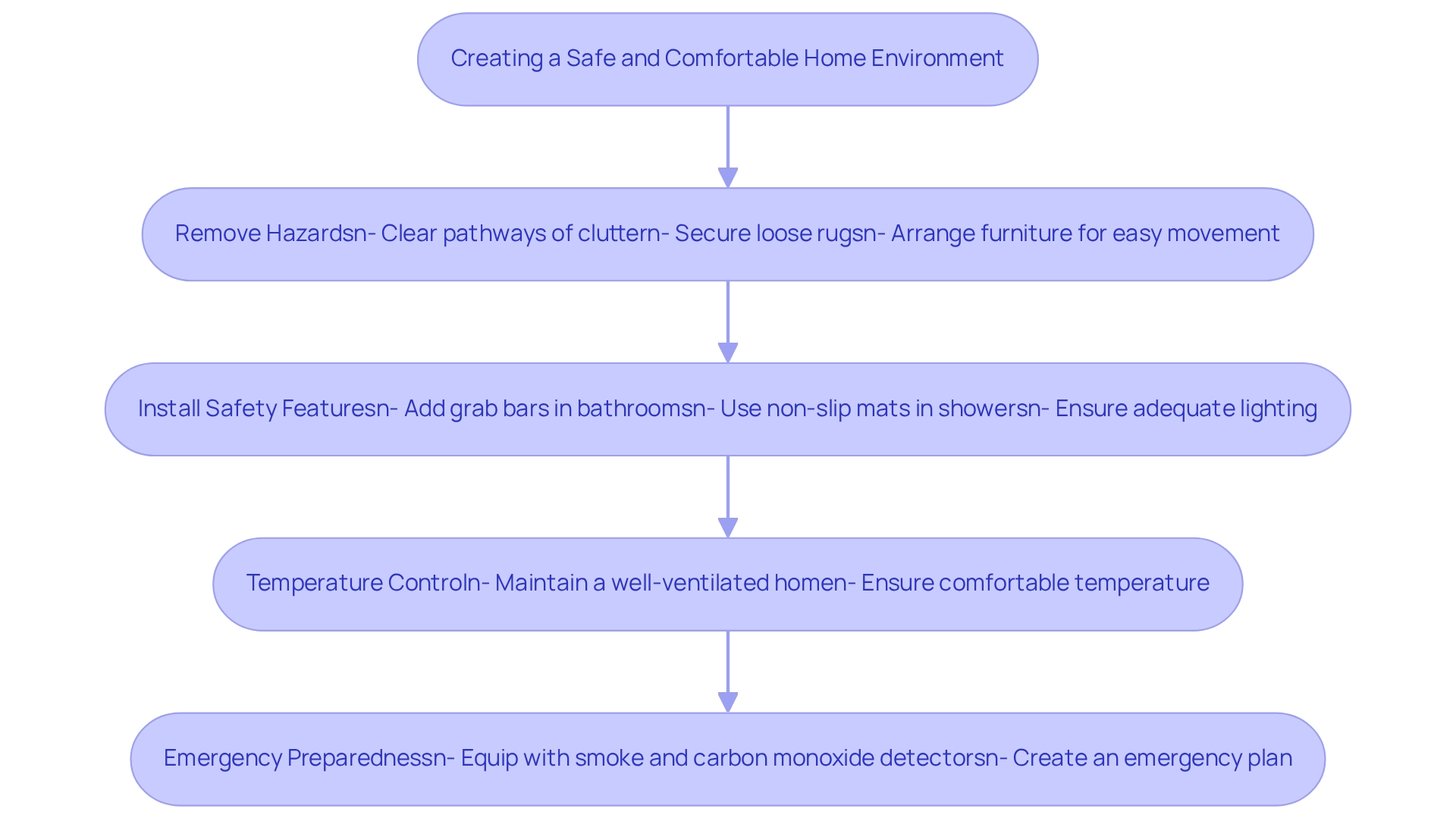
Establish a Consistent Caregiving Routine
To establish a consistent caregiving routine, consider the following steps:
-
Daily Schedule: Begin by creating a daily schedule that includes regular times for meals, medication, personal care, and activities. This structure helps seniors understand what to expect each day, which can be particularly beneficial for those who may require assistance from CNAs or HHAs due to challenges with daily activities. Incorporate Activities: It’s also vital to include physical activities, hobbies, and social interactions in the routine. These elements keep seniors engaged and active, while companion services can play a crucial role in reducing the risks of isolation and enhancing their quality of life.
-
Flexibility: While consistency is essential, it’s important to remain flexible to accommodate the senior’s changing needs or preferences. Adjust the routine as necessary to ensure it remains effective and enjoyable, especially as health conditions may evolve.
-
Communication: Regularly discuss the routine with the elderly person to ensure they feel comfortable and involved in their care plan. Open communication with those providing assistance, whether CNAs or HHAs, is crucial to address any concerns and ensure quality care in the context of caring for the elderly at home. By following these steps, those offering support can create a structured environment that fosters a sense of security and well-being for elderly individuals. This approach not only enhances their independence but also improves their overall quality of life. Remember, we’re here for you, and your comfort is our priority.
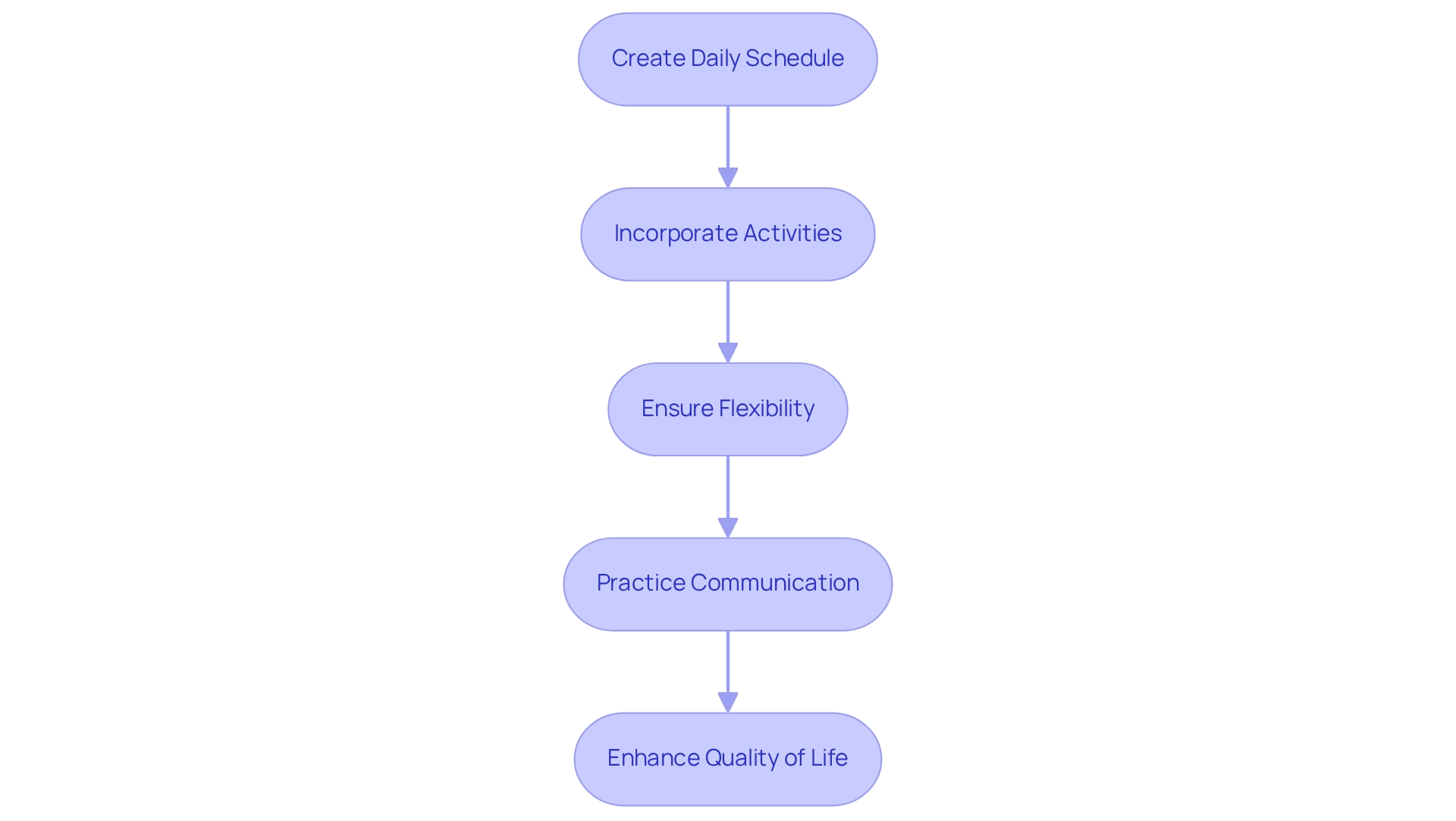
Prioritize Caregiver Well-Being and Support
To prioritize the well-being and support of those who provide care, implement the following strategies:
- Self-Care: It’s essential for caregivers to take regular breaks, engage in physical activity, and pursue hobbies that help recharge their energy and maintain mental health.
- Seek Assistance: Connecting with support groups or counseling resources can be invaluable for caregivers. Sharing experiences with others not only provides emotional relief but also offers practical advice.
- Utilize Resources: Explore community offerings, such as companion and sitter options provided by Best Care Nurses Registry. These tailored supports can significantly reduce the stress experienced by caregivers, ensuring that family members receive the social interaction and assistance they need to improve their independence and quality of life. Signs that may indicate a loved one requires this assistance include social isolation, challenges with daily activities like cooking or managing medication, and safety issues such as frequent falls.
- Open Communication: Create an environment where caregivers feel comfortable expressing their feelings and concerns. Regular check-ins can help identify stressors and encourage discussions about coping techniques.
Transitioning a loved one to companion or caregiver assistance can be a sensitive process. Start by discussing the benefits of having a companion, emphasizing how this support can enhance their quality of life and maintain their independence. Involve your loved one in the selection process, allowing them to meet and interact with potential companions to ensure a good fit. Gradually introduce the services, starting with shorter visits and increasing the duration as your loved one becomes more comfortable, while focusing on caregiver well-being and utilizing flexible respite care services for effectively caring for the elderly at home.
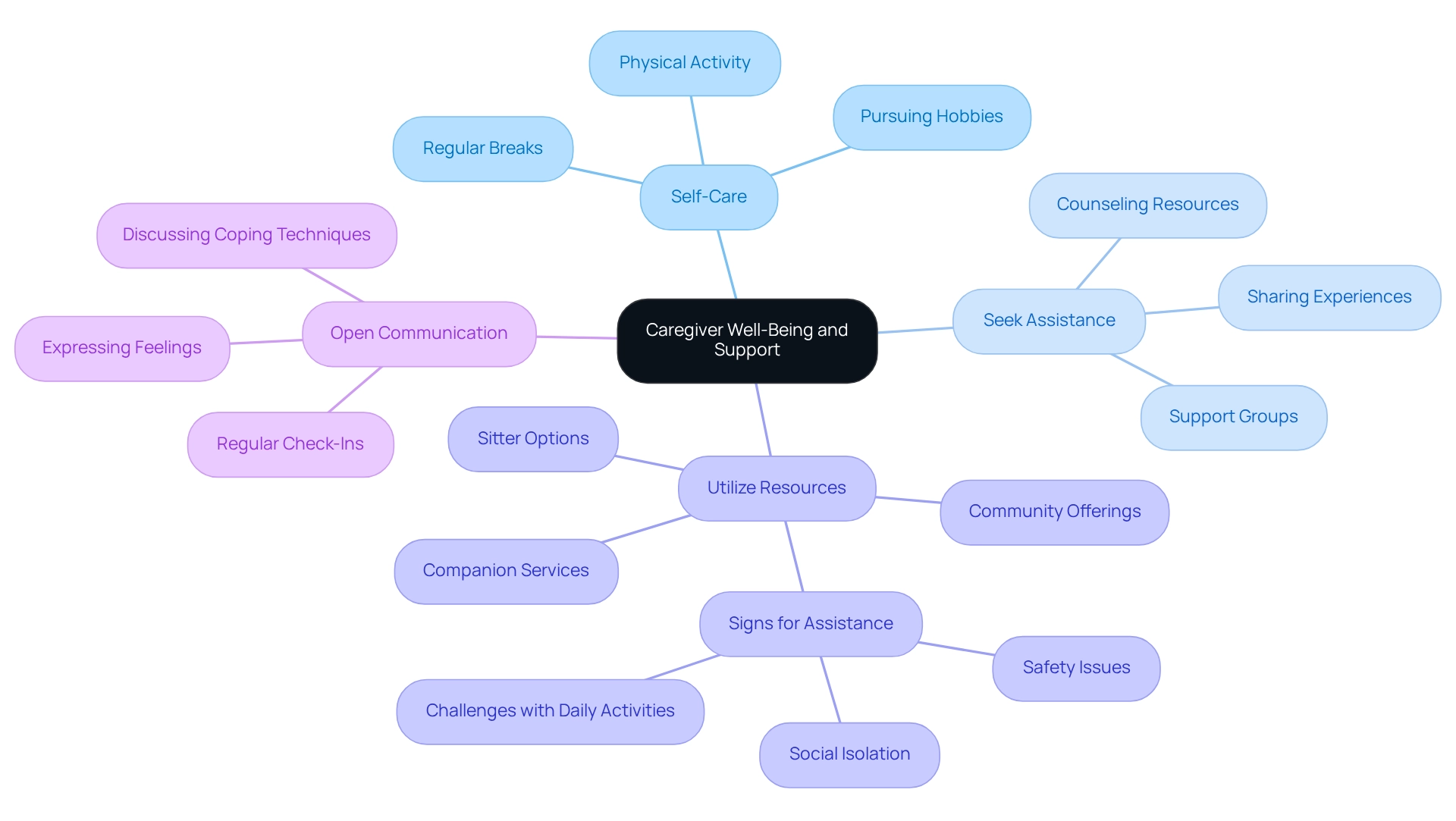
Conclusion
Understanding the unique needs of elderly individuals is paramount in ensuring their well-being and quality of life. By assessing their physical health, emotional well-being, cognitive function, and personal preferences, caregivers can develop tailored care plans that promote independence and dignity. Creating a safe and comfortable home environment further enhances this care; removing hazards and installing safety features significantly reduces the risk of accidents and fosters peace of mind for both seniors and their families.
Establishing a consistent caregiving routine is another critical aspect of effective elder care. A structured daily schedule that incorporates activities, flexibility to adapt to changing needs, and open lines of communication can profoundly impact the lives of elderly individuals. This routine not only provides stability but also encourages engagement and social interactions, which are essential for emotional health.
Equally important is the well-being of caregivers themselves. By prioritizing self-care, seeking support, and utilizing available resources, caregivers can maintain their mental and physical health, which directly influences the quality of care they provide. Fostering an environment of open communication allows caregivers to share their experiences and seek assistance when needed, ultimately leading to a more harmonious caregiving experience.
In conclusion, a holistic approach that addresses the needs of elderly individuals while supporting caregivers is vital in creating a nurturing and safe atmosphere. By implementing practical strategies and focusing on both the seniors’ and caregivers’ well-being, families can foster an environment that enhances the quality of life for all involved. Together, these efforts ensure that our elderly loved ones receive the compassionate care they deserve, allowing them to thrive in their golden years.
Frequently Asked Questions
What should be assessed when caring for the elderly at home?
When caring for the elderly at home, it’s essential to assess their physical health, emotional well-being, cognitive function, and personal preferences.
Why is it important to evaluate physical health in elderly care?
Evaluating physical health is crucial to identify any chronic conditions, mobility issues, or sensory impairments. Regular check-ups with healthcare providers can help monitor these conditions and prevent worsening health issues.
How can emotional well-being impact elderly individuals?
Emotional well-being is important because seniors may face challenges such as loneliness or depression. Engaging them in conversations about their feelings and encouraging social interactions can help mitigate social isolation, which can increase anxiety and depression.
What cognitive impairments should be considered in elderly care?
It’s important to be aware of cognitive impairments like dementia or Alzheimer’s disease. Tailoring communication and activities to their cognitive abilities ensures they receive the necessary support to maintain their independence.
How can personal preferences affect the care of elderly individuals?
Discussing personal likes, dislikes, and routines helps create a comfortable atmosphere that honors their uniqueness. Additionally, understanding their need for assistance with daily activities can significantly enhance their quality of life.
What daily activities might elderly individuals need assistance with?
Elderly individuals may need help with personal hygiene, meal preparation, and medication management to improve their quality of life.
Why is it important to consider domestic dangers in elderly care?
Being aware of domestic dangers is essential to ensure a secure living space for elderly individuals, minimizing potential threats while caring for them at home.

